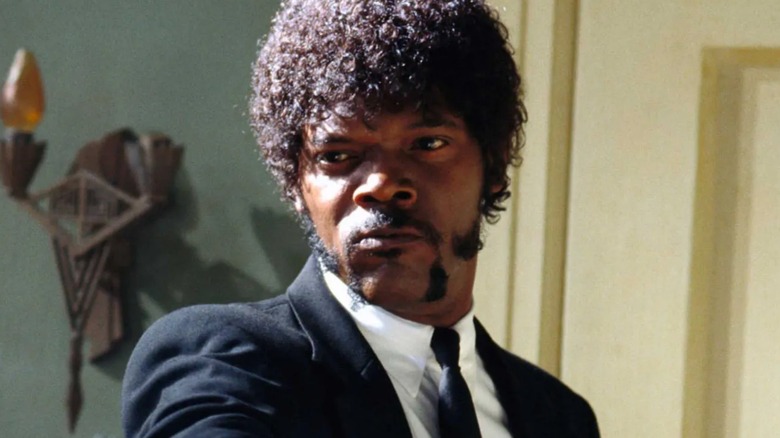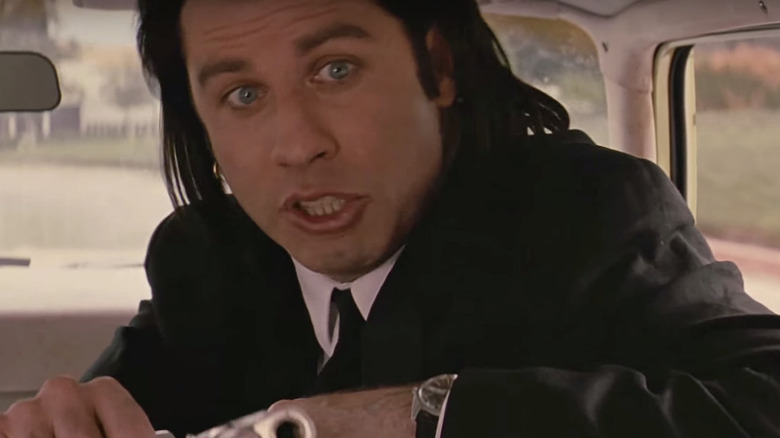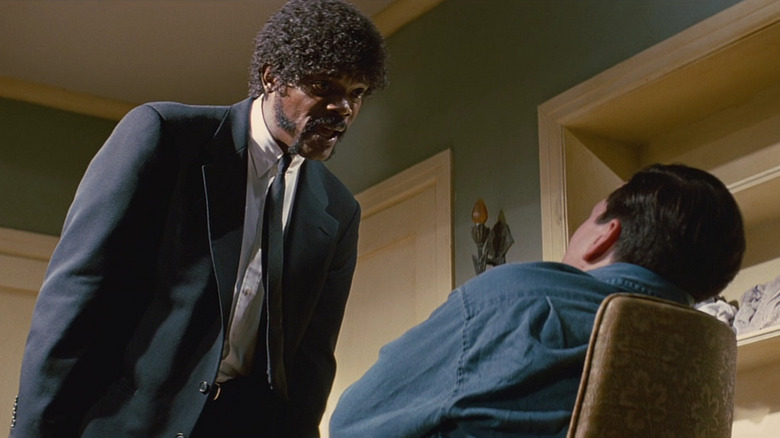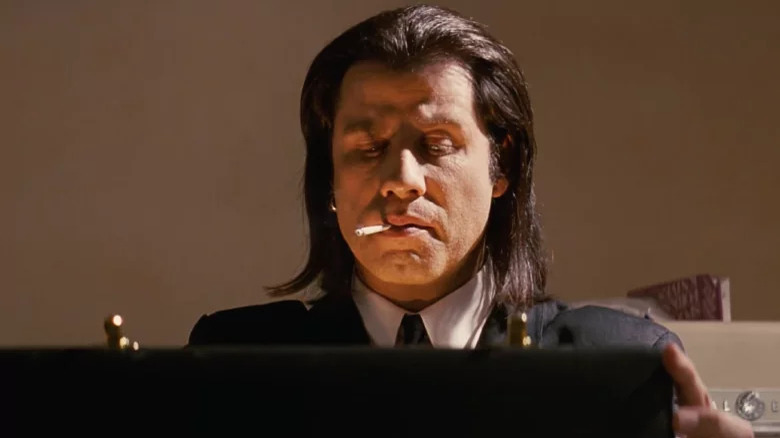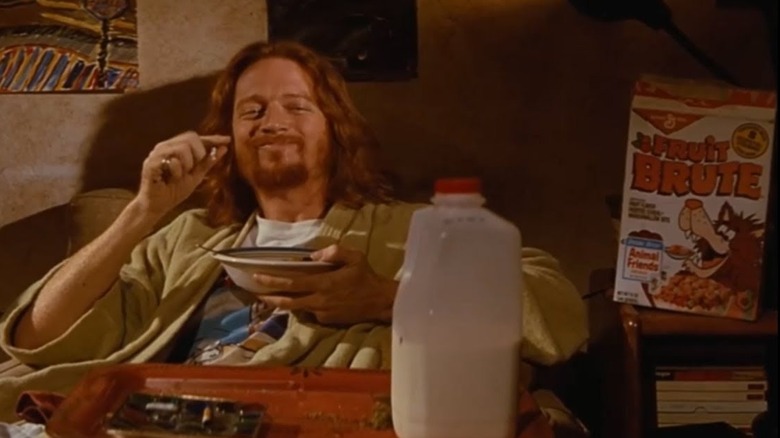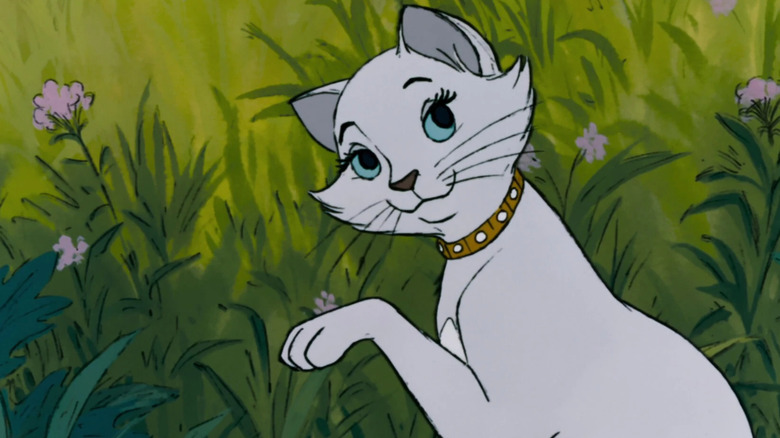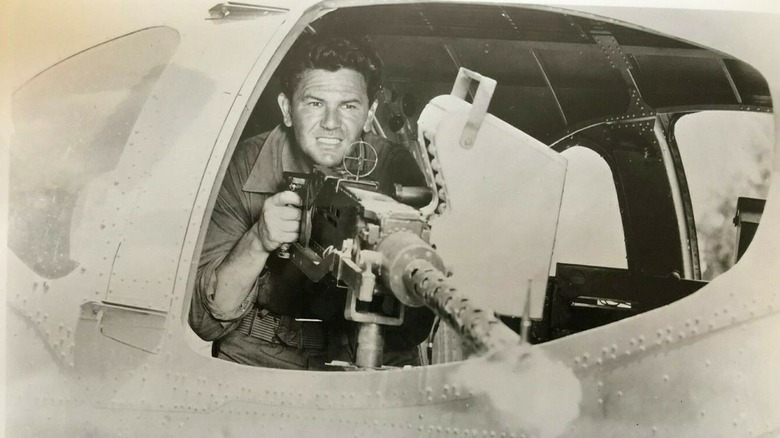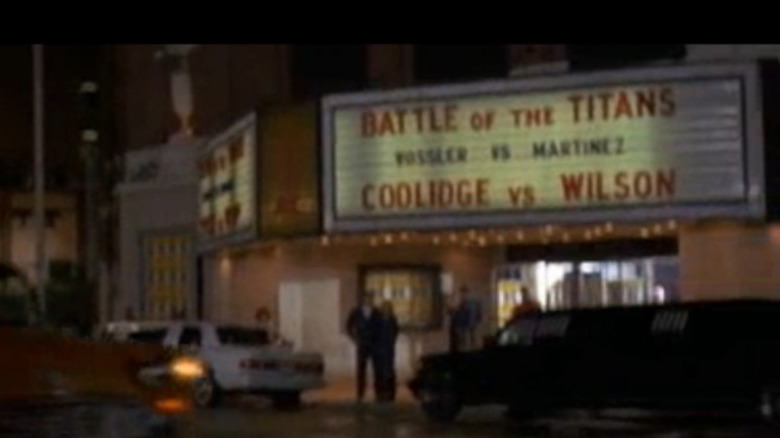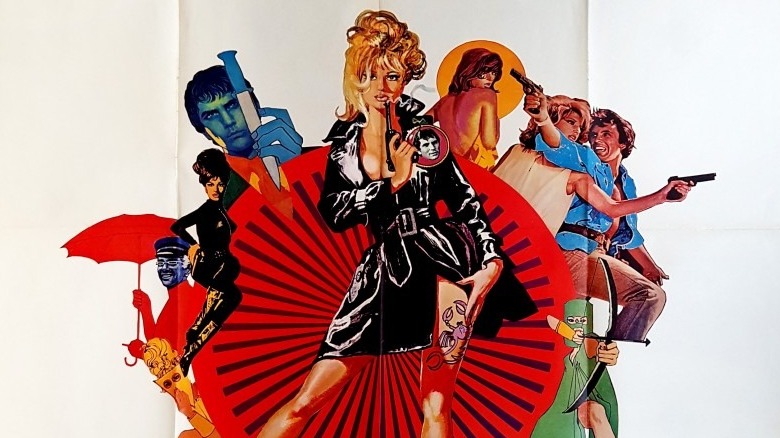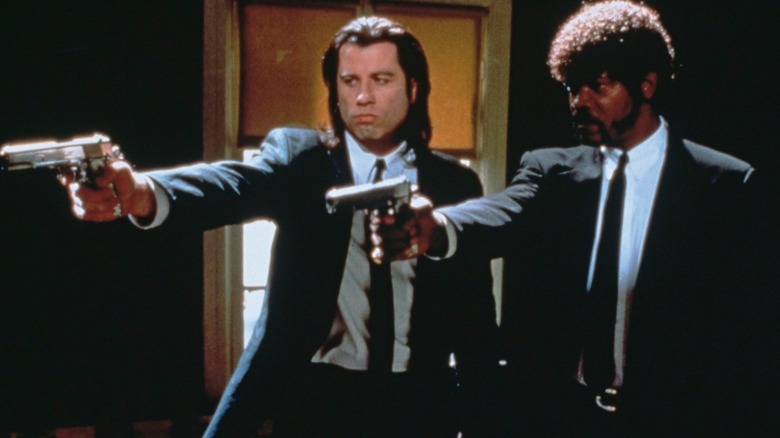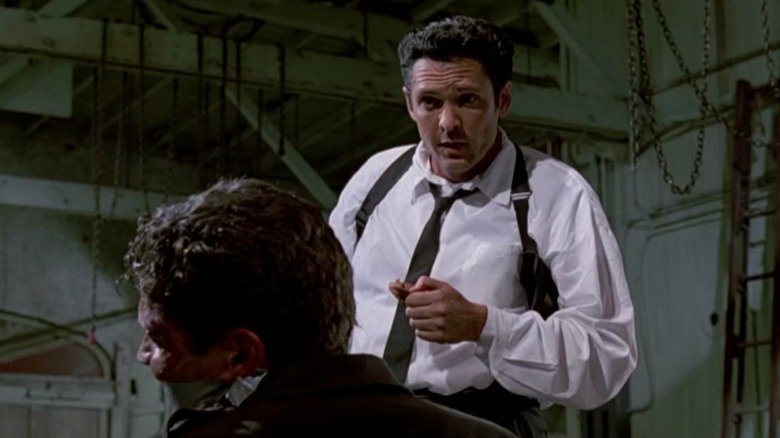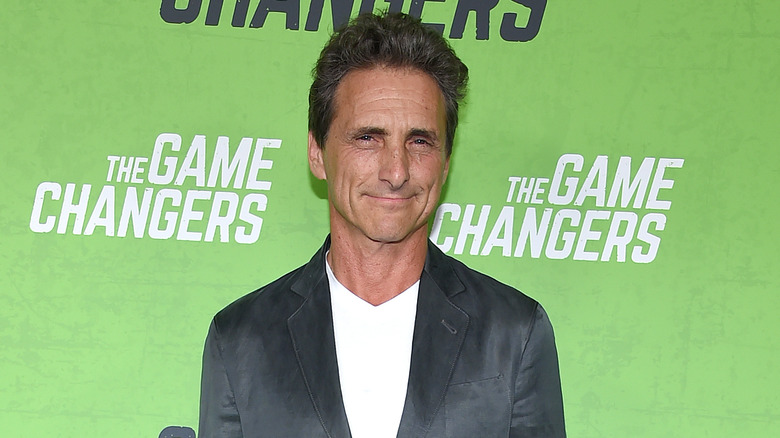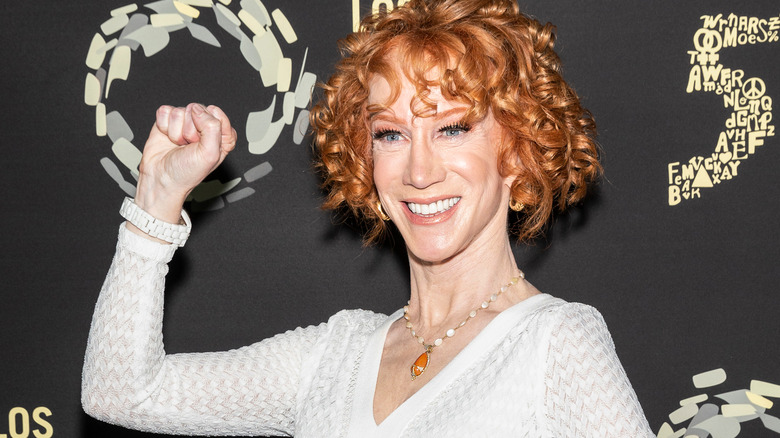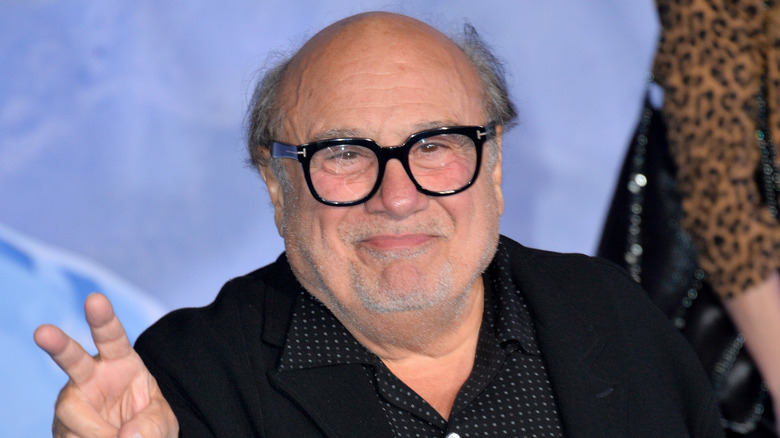The Untold Truth Of Pulp Fiction
It's no exaggeration to say "Pulp Fiction" changed American movies and culture. The film distilled the zeitgeist of Generation X into its most potent form, making an encyclopedic knowledge of media trash a benefit instead of a detriment to coolness. The decade after its release was full of wannabe "Pulp Fictions," featuring underworld ultraviolence, fractured timelines, interlinked stories, ironic distance, and pop culture references. But nothing else could recapture the feeling of writer/director Quentin Tarantino's unique smash film. The story, or stories, of two hitmen (Samuel L. Jackson and John Travolta), a boxer on the run (Bruce Willis), a mobster (Ving Rhames), and his mistress (Uma Thurman) remains a true original. Accept no substitutions.
"Pulp Fiction" is an uncompromised vision from a creator who went through a long, strange trip to bring it to the screen. This deeply personal, densely referential movie is almost like an inside joke between Tarantino and his viewers, and some of those references are so "inside" only a lucky few are in on them. Fortunately, we dug up the stories of that process and the meanings behind those references for you, along with even more untold truths behind "Pulp Fiction."
John Travolta's strange first meeting with Tarantino
John Travolta came to "Pulp Fiction" at a low point in his career. He started out strong in the '70s, parlaying his success in the TV smash hit "Welcome Back, Kotter" into even bigger roles in films like "Grease," "Saturday Night Fever," and "Blow Out," the last of which Quentin Tarantino has named as one of his top three movies ever made. But Travolta hadn't made a movie like that in a long while by the time he got the call from Tarantino in the early '90s. After the success of his debut feature, "Reservoir Dogs," Tarantino had the clout to live out his dream and make his idol a star again.
That's a very kind gesture, but a story Travolta tells makes it sound almost creepy. The New Zealand Herald quotes his tale of being invited to Tarantino's house and discovering his collection of Travolta-themed board games. "He just had this fantasy of being with his favorite actor and playing the board games from that actor's movies," Travolta says. Fortunately, Travolta found this odd behavior thoughtful and charming — maybe because he'd never seen "Misery."
Jules' Bible passage isn't really biblical
"Pulp Fiction" is one of the most quotable movies ever made, but few lines have stuck in viewers' heads quite like the monologue that Samuel L. Jackson's character Jules delivers to his victims, which later inspires him to leave crime behind. He claims to be quoting scripture, specifically Ezekiel 25:17. Of course, if you know how biblical citation works, you'll notice it goes on a lot longer than one verse, and in fact, only the ending of the speech comes from the source Jules claims for it. The rest is a mishmash of Old and New Testament, from Genesis ("his brother's keeper") to the 23rd Psalm ("the valley of darkness"). It seems like a classic example of Quentin Tarantino's irreverent mix-and-match approach to writing — and it is — but as it turns out, he didn't actually write this monologue at all.
Jules' speech actually comes from "Bodigaado Kiba," a movie that would be right up Tarantino's alley — a low-budget comic book adaptation full of crime and violence, starring legendary martial artist Sonny Chiba. For its American release, retitled "The Bodyguard" (even though Whitney Houston had exactly nothing to do with it), Aquarius Releasing added a new narrated text prologue. Right down to the bogus citation, it's almost word-for-word identical to Jules' big speech, though Tarantino naturally had to take out the reference to Chiba's character ("And you will know my name is Chiba the Bodyguard when I lay my vengeance upon them").
The history behind the briefcase
For over 25 years, "Pulp Fiction" fans have wanted to know just one thing: What's in the briefcase? When we first meet Jules Winnfield (Samuel L. Jackson) and Vincent Vega (John Travolta), they're on a mission to retrieve a briefcase stolen from their boss, Marsellus Wallace (Ving Rhames). Audiences are never shown what's inside or given any hint of the contents, other than a potentially supernatural golden-orange glow when Vincent opens it.
The mystery surrounding the briefcase's contents has proven to be an essential part of the movie's lasting appeal, leading to wild speculation and countless fan theories. However, Tarantino started out with a much more concrete answer. In early drafts of the script, the briefcase simply contained diamonds. But according to the book "Pulp Fiction: The Complete Story of Quentin Tarantino's Masterpiece" (via Lifehacker), co-writer Roger Avary told Roger Ebert in a 1997 interview, "[Diamonds] just seemed too boring and predictable. So it was decided that the contents of the briefcase were never to be seen. This way each audience member would fill in the blank with their own ultimate contents." Avery also added that the idea of putting an orange lightbulb in the case to create a supernatural glow came later and that he personally considered it a mistake.
Tarantino is also known to have pulled some influence for the briefcase MacGuffin from the 1955 film noir "Kiss Me Deadly," which also features a glowing case but never reveals the contents.
Lance's cereal is one of Tarantino's most prized possessions
Actor Eric Stoltz appears in "Pulp Fiction" as Lance, the local drug dealer who supplies Vincent with the junk that almost kills Mia Wallace (Uma Thurman) and has to walk him through the process of reviving her. We meet Lance lounging on the sofa in front of TV reruns with a bowl of cereal.
The specific brand is the kind of detail most directors wouldn't think twice about, but it was serious business to Quentin Tarantino. That's Fruit Brute, the long-discontinued monster cereal that used to adorn grocery store shelves around Halloween along with its more famous counterparts Count Chocula and Frankenberry. The brand went out of regular circulation eight Halloweens after its debut and was soon forgotten by just about everyone — except for Tarantino, apparently. (General Mills did eventually bring Fruit Brute back to store shelves in 2013 to haunt your breakfast table with the rest of the monster cereal gang.)
This isn't even the first time the director snuck it into one of his movies — you can see it in Mr. Orange's apartment in "Reservoir Dogs," underneath the Silver Surfer poster. It's a seemingly insignificant detail, but it goes a long way to establishing the weird, timeless "Pulp Fiction" world, where Vince may carry a '90s-tastic cell phone and the Vietnam War may be long ago in Butch's childhood, but the '70s still never really ended.
Tarantino's secret muse
Quentin Tarantino frequently referred to Uma Thurman as his muse throughout the period of time they worked together on "Pulp Fiction" and both volumes of "Kill Bill." Years later, Thurman would take issue with the label and publicly denounce the idea of male directors designating women as their muses. But it turns out Tarantino may have actually had a second muse during the making of "Pulp Fiction," in the form of actress Jennifer Beals of "Flashdance" fame. Beals does not act in the film and was not involved behind the camera either, but she did receive a "special thanks" credit.
In a 2004 interview with Steppin' Out magazine (via The L Word Online), Beals explained, "Quentin and I are friends ... he stayed at my house quite a bit during the making of that movie, so that's probably why he thanked me." She did end up acting briefly in the vignette that Tarantino directed in "Four Rooms," but she has never appeared in one of his solo feature films. She was also featured talking about Tarantino in a behind-the-scenes video about the making of "From Dusk Till Dawn," even though she had no involvement in the actual film.
Vince's car belonged to Quentin Tarantino...for a while
"Pulp Fiction" restored John Travolta's cool when he was cast as the character Vincent Vega. The man has cool clothes, cool dialogue, and, of course, a cool car. And Tarantino would know — that's his own red Chevy Vince is driving.
The director bought the '64 Chevy Malibu Super Sport five years earlier with the money he made selling the script for "True Romance." The model was part of the Chevelle series, Chevrolet's first muscle cars, and a favorite for classic car fans.
That must have made it a tempting target for carjackers, and maybe seeing it onscreen got one thief's attention, since the Malibu went missing from Tarantino's LA home the year "Pulp Fiction" premiered. Tarantino probably assumed he'd never get it back, but believe it or not, he did — more than 15 years later. The Malibu was found in 2013, and its owner at the time wasn't charged, which only seems fair — over all those years, the car probably changed hands many times since the original thief got hold of it.
Tarantino tapped high and low culture for the dance contest scene
There's nothing Quentin Tarantino loves more than dropping references to other movies into his own, and the twist contest in Jackrabbit Slim's is a doozy. On the "Chit Chat" documentary extra included on the film's Blu-ray release, John Travolta recalled that Tarantino screened director Jean-Luc Godard's "Bande á Part" for him to convey the vibe he was looking for. One of the founders of the French New Wave, Godard was a huge influence on Tarantino's early films and even received a dedication on the title page of the "Reservoir Dogs" screenplay. Tarantino's production company, A Band Apart, is named after Godard's "Bande á Part," but Godard wasn't exactly flattered by the reference and didn't much care for Tarantino's work. In return, Tarantino eventually said he had moved past Godard and wasn't a fan of his any longer.
In "Bande á Part," the main characters dance to the jukebox in a coffee shop, which was a clear influence on the dance in Jackrabbit Slim's. Over the years, everything from Federico Fellini's "8 ½" to the old Adam West "Batman" series has been pointed to as Tarantino's influence for the twist contest, but Tarantino himself has said he took the dance directly from an unlikely source: the 1970 animated children's film "The Aristocats." During an appearance on "The Graham Norton Show," Tarantino explained, "The image that I had in my mind was the Zsa Zsa Gabor cat from 'The Aristocats.'"
A classic war movie crossover was snuck into the watch monologue
If anyone in "Pulp Fiction" gets a monologue as memorable as Jules', it's one-scene wonder Christopher Walken as Captain Koons. In a flashback to Butch Coolidge's childhood, he arrives to deliver the boy's heirloom watch, along with its history, including an inappropriately graphic description of just how Koons and Butch's father hid it from their captors in a POW camp. Another of the watch's previous owners, Dane Coolidge, died in World War II at the battle of Wake Island, but not before entrusting the watch to an Air Force gunner named Winocky.
The man's name seems like an odd detail to include, and Quentin Tarantino doesn't do it arbitrarily. It's a tribute to Howard Hawks, the multi-talented Old Hollywood master behind every kind of film: romantic comedies like "His Girl Friday," gangster dramas like the original "Scarface," film noir like "The Big Sleep," musicals like "Gentlemen Prefer Blondes," and Westerns like "Red River," to name just a few. The same unique vision connected them all, especially his pioneering use of witty, overlapping dialogue that paved the way for Tarantino. The younger director paid his debt by placing the events of former pilot Hawks' 1943 war flick "Air Force" in the "Pulp Fiction" world, inserting John Garfield's character Sergeant Joe Winocki into Captain Koons' story.
Jokes are hidden in the fight marquee
"Pulp Fiction" is so dense you can't afford to blink for a minute, or you might miss something. Chapter Two, "The Gold Watch," shows the fallout from a boxing match where Marsellus Wallace bribes boxer Butch Coolidge to throw a fight. Instead, Butch doesn't just win — he beats his opponent literally to death and runs off with the money. With all that action, you might not notice the names on the marquee advertising the fight: "Coolidge vs. Wilson." There's a sly historical in-joke here, referencing two early 20th century U.S. presidents: Woodrow Wilson and Calvin Coolidge.
And if that's not inside enough for you, Tarantino throws in another reference on that marquee just for himself and a few close friends. In smaller letters above Coolidge and Wilson, the venue also advertises a bout between Vossler and Martinez. Who the heck is that? In "My Best Friend's Birthday: The Making of a Quentin Tarantino Film," Andrew J. Rausch chronicles Tarantino's early days as a lowly video store clerk working alongside Russell Vossler and Jerry Martinez. Obviously, the rising superstar never forgot where he came from, and he threw a tribute to his friends into the movie that made him a major Hollywood player.
Tarantino dropped a reference to a long-developing project into Pulp Fiction
Vincent Vega has a bad habit of going to the john at the worst times. When Butch runs home to pick up his watch, he discovers Vince is waiting for him when he finds his gun on the counter and shoots Vince as he leaves the toilet. Later in the film — but chronologically before his death — Vince takes another powder and misses Jules' confrontation with the stick-up artists in the diner. Both times, he's carrying a copy of "Modesty Blaise," one of a series of spy thrillers starring writer Peter O'Donnell's comic strip heroine, a former war orphan and international criminal who does freelance work for the British secret service.
Quentin Tarantino's obviously a fan, and he nearly put his own stamp on the character. At some point, Miramax bought the rights to the "Modesty Blaise" series, apparently in the hopes that Tarantino would make a big screen adaptation. Nothing ever came of it, and in order to keep from losing the rights, the studio turned out a quickie direct-to-video movie called "My Name Is Modesty." And we do mean quick — The whole thing was thrown together in 18 days with a director who'd only been on the job for a week before filming started. Tarantino still hasn't shown any indication of making his own "Modesty" movie, but he did get a credit on "My Name Is Modesty" as producer.
Samuel L. Jackson's mother asked why they didn't put Pulp Fiction together right
The non-linear storytelling in "Pulp Fiction" was revolutionary in 1994, thanks in no small part to editor Sally Menke's Oscar-nominated work. Opening with a prologue featuring two characters whose relevance to the main story doesn't become apparent until the end, and showing the deadly results of Vince's decision to continue his violent occupation before we see the decision itself, "Pulp Fiction" blew audiences' minds. Quentin Tarantino didn't invent this style of storytelling — you can see it in novels like James Joyce's "Ulysses" or Kurt Vonnegut's "Slaughterhouse-Five," as well as movies like "Citizen Kane" — but he turned it from an intellectual exercise to a crowd-pleasing gimmick. In the process, he inspired hundreds of imitators, from Christopher Nolan's backwards breakout hit "Memento" to the intersecting plotlines of Paul Thomas Anderson's "Magnolia" to Tarantino's own future films.
But not everyone was such a big fan. In the documentary extra included in one of the "Pulp Fiction" DVD releases, "Not the Usual Mindless Boring Getting to Know You Chit Chat," Samuel L. Jackson recalled, "I remember my mom saying, 'Why didn't they put the movie together right? ... It was jumping all over the place, back and forth, you're dead, you're alive, you're back, you're here!' I said, 'Ma, that's just how the movie works ... Everybody can't watch it, apparently you can't.'"
Tarantino has a script for a Pulp Fiction/Reservoir Dogs crossover
Vincent Vega's name may sound familiar to fans of Tarantino's first film, "Reservoir Dogs," where the only named member of the color-coded crew is Michael Madsen's psychotic Mr. Blonde, aka Vic Vega. That's more than just a coincidence — Tarantino envisioned the two characters as brothers and wrote a whole script exploring their relationship. Madsen revealed some of the details a couple of years ago: Vince and Vic would have met after being released from prison in different states and started a club in Amsterdam, neatly tying into Vince's legendary discussion of the city in "Pulp Fiction."
Unfortunately, other projects kept getting in the way, and by now both Madsen and Travolta are far too old to convincingly play their own younger selves. The idea has still resurfaced, moving the time frame from before the characters' deaths to after, and focusing instead on two other Vega brothers who meet at their siblings' funeral. But for now, it looks like either version will only exist in fans' imaginations.
The secret connection to Four Rooms and Fresh
Quentin Tarantino is well-known for sneaking in subtle connective tissue between his movies, but one of the subtlest and least talked about connections in the QT universe doesn't actually come from Tarantino himself. "Four Rooms" is an anthology film for which Tarantino wrote and directed one of its four segments. "Fresh," on the other hand, has no direct Tarantino involvement, though it does star Tarantino regular Samuel L. Jackson. Nevertheless, both films share the same deep-cut connection to "Pulp Fiction" in the form of Lawrence Bender, who produced all three films but, more importantly, played the same cameo role in each of them.
Bender is credited in all three films, which were released between 1994 and 1995, as "Long Hair Yuppie Scum." The implication is that the same yuppie who is present for Pumpkin and Honey Bunny's diner robbery in "Pulp Fiction" is also on the streets in "Fresh" and later attends the New Year's Eve party in "Four Rooms." Besides "Fresh" and the work of filmmaker Robert Rodriguez, the only other movie that can claim a connection to the QT universe — that wasn't written or directed by Tarantino himself — is Steven Soderbergh's "Out of Sight." That film features Michael Keaton as Detective Ray Nicolette, the same character he played in Tarantino's "Jackie Brown." The character originates in the novels of Elmore Leonard, but casting Keaton in the same role in two films released within a year of each other is no coincidence.
Tarantino gave his girlfriend a cameo
The cast of "Pulp Fiction" is packed with thriving and waning stars alike. One famous name on the cast list is Kathy Griffin, in a brief cameo role as one of the women who comes to Marsellus Wallace's (Ving Rhames) aid after he is run over by Butch Coolidge (Bruce Willis). She has a couple of lines and is the one who points a disoriented Marsellus in Butch's direction after the crash. Though Griffin became a well-known actor, comedian, and reality TV star later on, she wasn't yet famous at the time "Pulp Fiction" was made.
Griffin dated Quentin Tarantino for a period of time, and the writer-director gave her a cameo in the film, even crediting Griffin as playing herself. Tarantino got her an even larger role in the following year's "Four Rooms." When Tarantino guest-directed an episode of the popular television show "ER," Tarantino again gave Griffin a role. One year later Griffin had her first stand-up comedy special on HBO and rose to new levels of fame. Griffin credits Tarantino with sticking his neck out to help her break into the industry and, although they didn't work out romantically, they have remained on good terms over the years.
Danny DeVito got the film made
Danny DeVito is best known as an actor, so his involvement in "Pulp Fiction" may come as a surprise given that he doesn't appear in the film. Instead, DeVito's involvement was entirely behind the scenes: DeVito was one of the film's executive producers and was actually the first to take the project under his wing before the script was even written.
After making a name for himself as a successful actor, DeVito made a pivot toward producing in the early '90s, and one of the first projects he took on was "Pulp Fiction." DeVito told The Guardian, "I hadn't seen Quentin direct or act. I hadn't even seen 'Reservoir Dogs' when I bought his next project, which wasn't even written. It was just about him. I liked the way he was talking about it." It speaks to Tarantino's charisma and passion for cinema that he was able to get DeVito on board sight unseen.
"Pulp Fiction" was originally set up as a Columbia-TriStar production, but after the studio dropped the project due to worries that it was too violent and general doubts over its quality, DeVito personally ensured that the film found a new home at Miramax to stave off disaster. Without DeVito's hard work behind the scenes, there's a chance "Pulp Fiction" may have fallen apart before reaching theaters.
